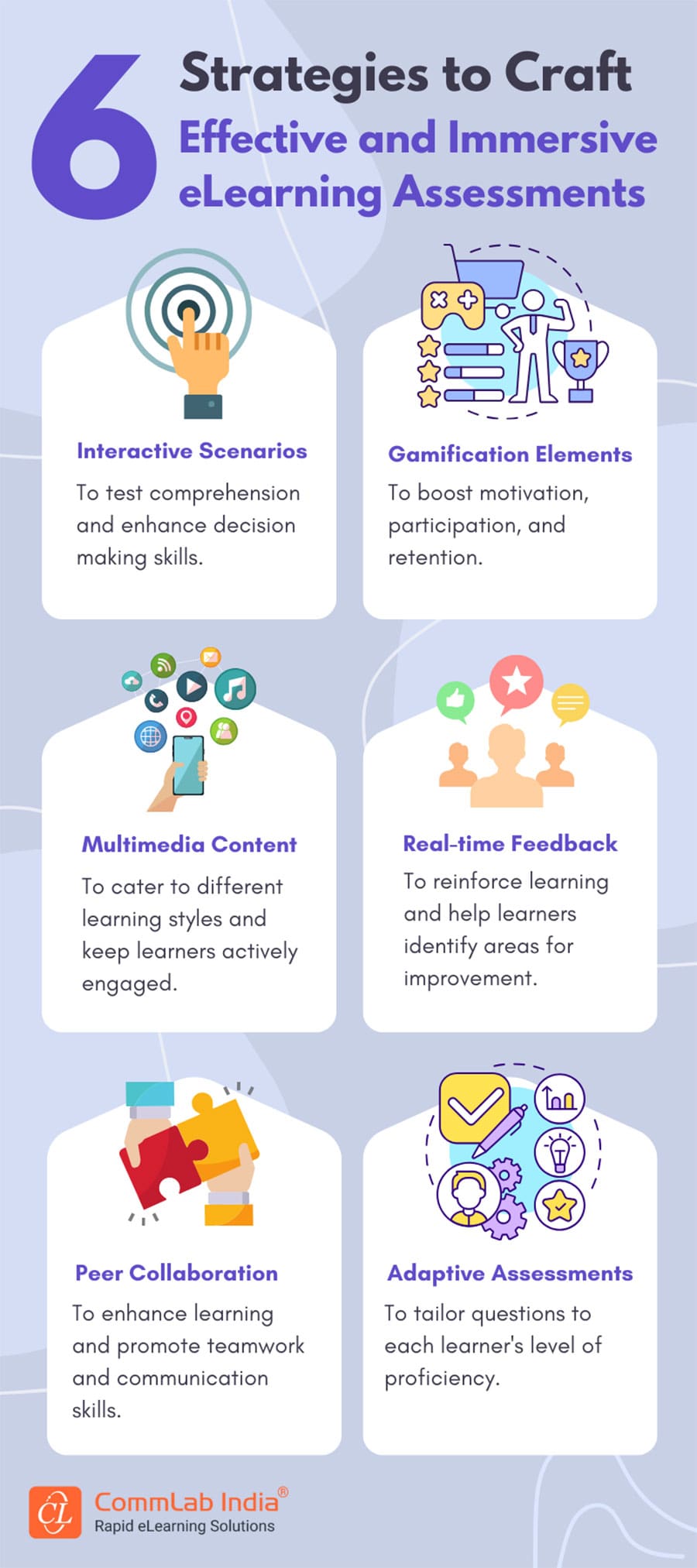How to Design Effective eLearning Assessments? [Infographic]
Designing effective, immersive eLearning assessments is crucial for an impactful learning experience. Get it right with the strategies shared in this blog.

In today's fast-paced digital age, corporate training has transcended the traditional classroom setting. It has shifted toward more innovative and interactive methods. One such that has maintained its relevance and popularity even in the ever-changing business and L&D scenarios is eLearning. It significantly changed, and still continues to improve the way individuals access knowledge and skills. Central to the effectiveness of eLearning are eLearning assessments. They serve as a tool for gauging the understanding and progress of learners. The results derived from these assessments serve as a guiding light for improving the training course content, changing the instructional design strategy, and more!
Given the importance eLearning assessments hold in the entire process of corporate training and effective learning experiences, creating high-quality, engaging assessments is necessary! Therefore, in this blog, we’ll take a deeper dive into the world of eLearning assessments, exploring the benefits, different types, strategies, and top 3 eLearning assessment formats.
Are you ready? Let’s begin!
Benefits of Engaging and Immersive eLearning Assessments
Enhance Learning Experience
In contrast to conventional assessments that often induce stress and anxiety, engaging eLearning assessments foster a positive learning experience. They can include various formats like interactive quizzes, simulations, branching scenarios, multiple choice questions (MCQs), etc. It allows learners to get actively involved in the learning process, leading to improved retention and comprehension.
→ Download Now: Instructional Design Strategies for Engaging eLearning Courses
Boost Information Retention
Engaging and immersive eLearning assessments stimulate the learner's cognitive processes. They provide learners with chances to interact with the learning material, making it easier for them to absorb, apply, and retain information. When learners actively participate in assessments and receive immediate feedback, they reinforce their understanding and memory of key concepts. This results in higher rates of information retention.
Enhance Completion Rates
Learner engagement is an important factor in giving completion rates a much-needed boost. No matter how well-crafted the training course is, if the learners don’t take the eLearning assessment, it still misses the completion mark. Therefore, to guarantee a holistic learning experience, creating engaging and immersive eLearning assessments is essential. It motivates learners to progress through modules and complete the evaluation process to achieve their learning objectives.
6 Strategies to Craft Effective and Immersive eLearning Assessments
Different Types of eLearning Assessments
Formative assessment
It is a type of evaluation conducted during the learning process. It provides trainers with learning analytics that enable them to gain insights into learner progress and provide feedback to improve learning. Moreover, trainers also get an idea about how their instructional methods are working. They can make necessary changes accordingly to enhance the outcome.
Summative Assessment
It is an evaluation that takes place at the end of a training program. Summative assessment is used to measure learners’ overall achievement or mastery of content. It focuses on evaluating the final outcomes of learning and making judgments about learners’' performance.
Top 3 eLearning Assessment Formats
- Quizzes: These are fundamental assessment tools in eLearning. They can take up different formats like multiple-choice questions, true/false statements, fill in the blanks, or even one-word answers. Quizzes provide a quick snapshot of learner understanding and can be easily integrated into eLearning modules.
- Simulations and Scenarios: Immersive simulations and scenarios simulate real-world situations, allowing learners to apply theoretical knowledge in practical contexts. This promotes critical thinking, problem-solving skills, and decision-making abilities, making learning more engaging and relevant.
- Collaboration Projects: Online group collaboration projects are an effective method for assessment. They can be used in corporate training to facilitate teamwork, knowledge sharing, and skill development among employees in virtual environments.
Wrapping It Up!
Engaging eLearning assessments are the key to ensuring a comprehensive learning experience and measuring the effectiveness of the training program. Apart from that, they offer a multitude of benefits for both learners and trainers. They get an idea about strengths and shortcomings, based on which learners can revisit the necessary concepts, and trainers can adjust their instructional delivery method to maximize the learning outcome and training ROI. To reach assessments, creating learner-centric, impactful courses is inevitable. Check our free eBook to learn about the instructional design strategies for crafting engaging eLearning courses.







